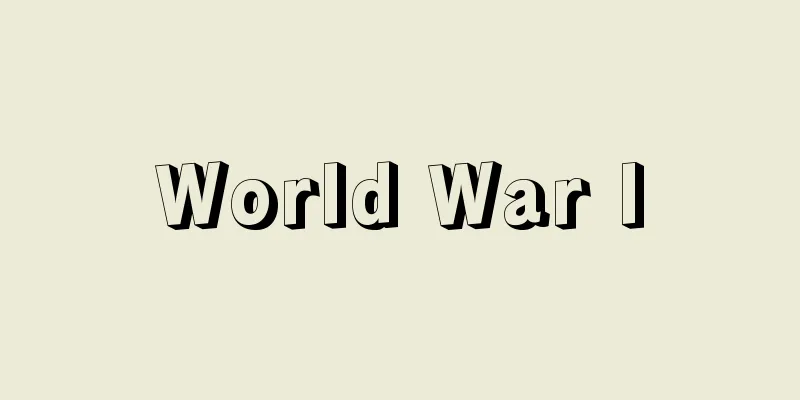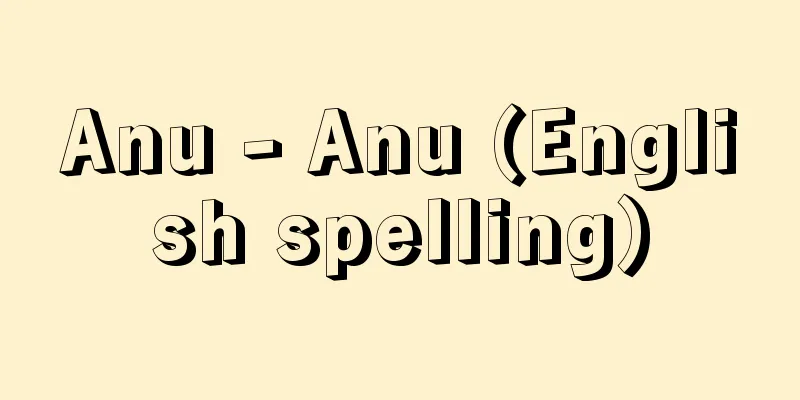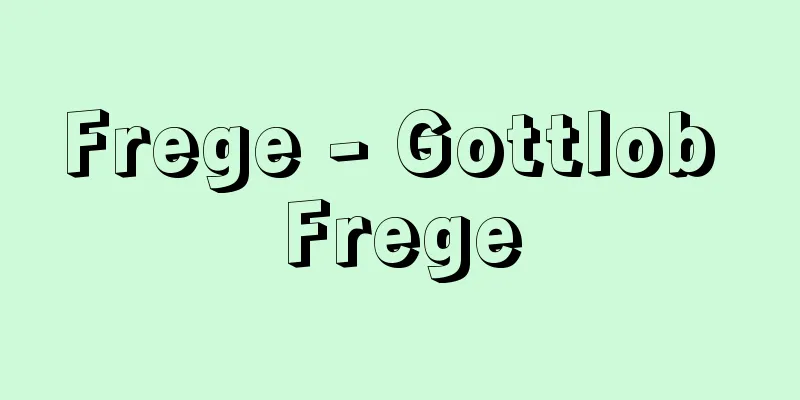World War I

|
A battle fought on a global scale from July 28, 1914 to November 11, 1918, mainly in Europe. It was the first total war in which many modern weapons were used and involved the general public. [Background] The division of colonies by the great powers, which began in the late 19th century, was almost completed around 1900, and a new crisis of imperialist war broke out between the great powers. In particular, the conflict between the two major camps, the Triple Alliance of Germany, Italy, and Austria, and the Triple Entente of Britain, France, and Russia, became the axis of international relations, and the relationship between the emerging country Germany, which was governed by the Three B policy, and Britain, which was governed by the Three C policy, was always tense. In the Balkan region, where many ethnic groups coexist, a national liberation movement had been occurring early on against the backdrop of the great powers' interference (the Eastern Question) following the weakening of the Ottoman Empire. In particular, the incorporation of Bosnia and Herzegovina into the Austro-Hungarian Empire (the issue of the annexation of Bosnia and Herzegovina) fueled Russia's sense of crisis towards Austria, which advocated Pan-Germanism, and became the spark that ignited World War I. [Start of the war] Following the Sarajevo incident on June 28, 1914, in which the Austrian Archduke and his wife were assassinated in Bosnia, Austria issued an ultimatum to Serbia on July 23 and declared war on the 28th. Russia responded with a general mobilization order, and Germany declared war on Russia on August 1 and France on the 3rd, and Britain declared war on Germany on the 4th, and by the end of August, all of the Allied and Entente nations except Italy were at war. [Early war situation] From the beginning, Germany aimed for a short, decisive battle on the Western Front, as proposed by Schlieffen, but was thwarted at the Battle of the Marne. After that, the front line became a stalemate, and between 1914 and 1915, there were the Battle of Ypres, another major German attack (Battle of Verdun), and a major British and French counterattack that lasted six months (Battle of the Somme), but the war situation did not change despite the introduction of new weapons such as bombers, tanks, and poison gas. On the eastern front, the Russian army, which had initially been dominant, suffered a major defeat in the Battle of Tannenberg and was on the defensive. In November 1914, Turkey joined the war on Germany's side, and the conflict spread to the Middle East. Italy was a member of the Triple Pact, but in May 1915, it declared war on Germany based on the London Secret Agreement. At sea, there were the Battle of Dogger Bank and the Battle of Jutland, but because the superior British fleet carried out a blockade operation, Germany had no choice but to rely on submarines (U-boats). [Situation in the Middle East] In response to Turkey's entry into the war, Britain annexed Cyprus and declared it a protectorate of Egypt. The Gallipoli expedition, conducted jointly with France, failed, but succeeded in blocking Turkish attacks in the Suez area. The great European powers tried to draw the oppressed peoples of the Middle East into their camps by promising them independence and autonomy after the war, but behind the scenes they made secret agreements to divide up the territories, complicating the issue. The contradiction between the Hussein-McMahon Letter, which promised independence for the Arab peoples after the war, and the Balfour Declaration, which allowed the creation of a Jewish state, left a particularly big problem (the Palestine problem). [War situation in Asia] In 1914, Japan declared war on Germany and occupied Tsingtao (Qingdao) and the German-controlled South Sea Islands, but its true purpose was to strengthen its voice in China, and it secured a foothold for its advance into East Asia through the Twenty-One Demands and the acquisition of control over Shandong Province. [Turning point in the war] With the outbreak of the war, anti-war and anti-imperialist movements in Europe were rendered powerless as social democratic forces in each country turned to support the government and the war, and the Second International also collapsed. However, the prolonged and total warfare of the war increased public discontent. In 1917, the Russian Revolution against the Tsarist tyranny succeeded, and the new Soviet government proclaimed the principles of peace and national self-determination, signing the Treaty of Brest-Litovsk with Germany separately in March 1918 and withdrawing from the war. Meanwhile, Germany, having lost control of the seas, began unrestricted submarine warfare in February 1917, putting Britain in a difficult position, but this stimulated public opinion in the United States, and the United States declared war on Germany in April of the same year. After that, the British and French armies received troops and supplies from the United States and began counterattacking, and from September 1918 the German army was completely on the defensive. German troops continued to advance on the eastern front after the Treaty of Brest-Litovsk, but encountered fierce resistance in various places. [End of the war] In 1918, anti-war movements in various countries came to the surface, and in Germany and Austria, demonstrations and strikes by soldiers and workers continued, and U.S. President Wilson announced the Fourteen Points, indicating the direction of the end of the war. In Germany, after the failure of a final general counterattack from March to July, a mutiny by sailors occurred at the Kiel naval port on October 28, which developed into the German Revolution, the Kaiser fled to the Netherlands, the German Republic was established, and an armistice was signed in the Forest of Compiègne on the outskirts of Paris on November 11. [Results of the war] The Paris Peace Conference was held in January 1919, and Germany signed the Treaty of Versailles in June. Thereafter, the Treaty of Saint-Germain, the Treaty of Neuilly, the Treaty of Trianon, and the Treaty of Sevres were signed between the Allies and the Entente Powers. The postwar system that emerged as a result is called the Versailles System. The Treaty of Versailles was based on Wilson's Fourteen Points, which proclaimed no annexations, no reparations, and national self-determination. However, the victorious nations attempted to re-divide territories based on secret agreements made during the war, and many colonies were ceded in the form of mandates, intensifying the independence and anti-imperialist movements of oppressed peoples. Germany was also forced to pay harsh reparations of 132 billion gold marks in addition to ceding territory and restricting its armaments, causing extreme economic chaos (German reparations issue). The League of Nations, which was established with the aim of maintaining international peace, was led by Britain and France because the United States and the Soviet Union did not participate, and it essentially became an organization that protected the interests of the victorious nations. Other events that arose as a result of World War I include the following: 1. The socialist Soviet Union was established, opening up a completely new arena for international politics that was completely different from the past. Furthermore, the policy of containing the Soviet Union by capitalist countries intensified the revolutionary movement around the world, leading to the establishment of the Comintern. 2. The United States' international superiority was established, and the shift to the center of the capitalist world, especially in economic terms, brought about a major change in the traditional European-centered international politics. 3. In Germany, which was subjected to severe sanctions, the Weimar Republic, which was seen as an ideal of democracy, collapsed amid social unrest, triggering the rise of the Nazis. 4. Ethnic consciousness grew among oppressed peoples, particularly in Asia and Africa, and organized movements for national liberation and independence developed. [Cases] Four Allied nations and 23 Entente nations participated in this battle. Approximately 10 million people were killed in action, 10 to 30 million were wounded, approximately 5 million civilians were killed or injured, and direct war costs amounted to approximately $180 billion. Related topics: Antwerp Olympics (1920) | Austro-Hungarian Empire | Military | Nouveau riche | Paris Peace Conference | Balkan Problems Source : Heibonsha Encyclopedia About MyPedia Information |
|
1914年7月28日から1918年11月11日,ヨーロッパを主戦場に世界的規模で行われた戦い。多くの近代兵器が使用され,一般国民をも巻きこんだ最初の総力戦であった。〔前史〕 19世紀後半に始まった列強の植民地分割は1900年ごろほぼ完了し,新たに列強間に帝国主義戦争勃発(ぼっぱつ)の危機が生じた。特にドイツ・イタリア・オーストリアの三国同盟と,英・フランス・ロシアの三国協商の2大陣営の対立が国際関係の軸となり,中でも三B政策による新興国ドイツと三C政策による英国との関係は常に緊張をはらんでいた。また多民族の混在するバルカン地域ではオスマン帝国の弱体化に伴う列強の干渉(東方問題)を背景に早くから民族解放運動が興っていた。とくにボスニア・ヘルツェゴビナのオーストリア・ハンガリー二重帝国への編入(ボスニア・ヘルツェゴビナ併合問題)はパン・ゲルマン主義を掲げるオーストリアに対するロシアの危機感を煽り,第1次大戦の発火点となった。〔開戦〕 1914年6月28日オーストリア皇太子夫妻がボスニアで暗殺されたサラエボ事件を契機に,オーストリアは7月23日セルビアに最後通牒(つうちょう)を発し,28日宣戦布告。これに対しロシアは総動員令によって応じ,ドイツは8月1日ロシアに,3日フランスに宣戦,4日英国がドイツに宣戦して,8月末までにイタリアを除く全同盟国・協商国が交戦状態に入った。〔初期の戦況〕 ドイツは最初からシュリーフェンの提案による西部戦線での短期決戦をねらったが,マルヌ会戦で挫折した。以後戦線は膠着(こうちゃく)状態となり,1914年―1915年の間はイープルの戦,ドイツ軍による再度の大攻撃(ベルダンの戦),半年にわたる英・仏軍の大反攻(ソンムの戦)などがあったが,爆撃機・戦車・毒ガスなど新兵器の投入にもかかわらず戦局は変わらなかった。東部戦線では初め優勢だったロシア軍もタンネンベルクの戦で大敗し,守勢に立った。1914年11月トルコがドイツ側に立って参戦,戦火は中近東に拡大した。イタリアは三国同盟の一員だったが,1915年5月ロンドン密約に基づき対独宣戦。海上戦ではドッガーバンクの海戦,ユトランド沖海戦があったが,優勢な英艦隊が封鎖作戦をとったため,ドイツは潜水艦(Uボート)にたよらざるをえなかった。〔中東の情勢〕 トルコの参戦に対し,英国はキプロス島併合,エジプト保護領化を宣言。フランスと共同で行ったガリポリ遠征は失敗したが,スエズ地区ではトルコの攻撃阻止に成功。ヨーロッパ列強は中東の被圧迫諸民族を自己陣営に引き入れようと,戦後の独立・自治を約束したが,その裏面で列強同士が秘密協定を結んで領土分割を図り,問題を紛糾させることになった。大戦後アラブ諸民族独立を約したフサイン=マクマホン書簡と,ユダヤ人国家の建設を認めたバルフォア宣言の矛盾は特に大きな問題を残した(パレスティナ問題)。〔アジアの戦局〕 1914年日本は対独宣戦,チンタオ(青島)およびドイツ領南洋群島を占領したが,真の目的は中国に対する発言権の強化にあり,二十一ヵ条要求,山東省支配権の獲得で東アジア進出の足場を確保した。〔戦局の転機〕 ヨーロッパの反戦・反帝国主義運動は,大戦勃発とともに各国の社会民主主義勢力が政府・戦争支持にまわったことにより無力化し,第二インターナショナルも崩壊。しかし戦争の長期化・総力戦化は民衆の不満を増大させた。1917年ツァーリ専制に反対するロシア革命が成功,新生ソビエト政権は平和と民族自決の原則を掲げ,1918年3月ドイツと単独にブレスト・リトフスク条約を結び,戦列を脱した。他方制海権を失ったドイツは1917年2月から無制限潜水艦作戦をとり,英国は窮地に陥ったが,それは米国の世論を刺激し,同年4月米国は対独宣戦に踏み切った。以後英・仏軍は米国からの兵員・物資援助を受けて反撃に転じ,1918年9月以降ドイツ軍は完全に守勢に立った。ドイツ軍はブレスト・リトフスク条約後も東部戦線で進出を試みたが,各地で激しい抵抗にあった。〔大戦の終結〕 1918年に入ると諸国の反戦運動は表面化し,ドイツ・オーストリアでは兵士・労働者のデモやストライキが続き,米国大統領ウィルソンは十四ヵ条平和原則を発表して戦争終結の方向を示した。3〜7月の最後の総反撃に失敗したドイツでは,10月28日キール軍港で水兵の反乱が起こり,これがドイツ革命に発展,皇帝はオランダに亡命,ドイツ共和国が樹立され,11月11日パリ郊外コンピエーニュの森で休戦条約に調印するに至った。〔大戦の結果〕 1919年1月パリ講和会議が開かれ,6月ドイツはベルサイユ条約に調印,以後同盟国と協商国との間でサン・ジェルマン条約,ヌイイー条約,トリアノン条約,セーブル条約が調印された。これによって出現した戦後体制はベルサイユ体制と呼ばれる。ベルサイユ条約は無併合・無賠償・民族自決等を謳ったウィルソンの十四ヵ条平和原則にのっとっていた。しかし戦勝国は戦時中の秘密協定に基づき領土の再分割を図り,植民地は多く委任統治の形で割譲され,被圧迫民族の独立運動・反帝国主義運動を激化させた。またドイツは領土割譲・軍備制限のほか1320億金貨マルクの苛酷な賠償金を課され,経済は極度に混乱した(ドイツ賠償問題)。国際平和の維持を目的として創立された国際連盟も,米・ソが不参加のため英・仏が主導権を握り,実質的には戦勝国の利益を擁護する機関となった。第1次大戦の結果生じた事態としては,さらに次のようなことがあげられる。1.社会主義国ソ連が成立し,従来と全く異なる新しい国際政治の場が開かれた。また資本主義諸国によるソ連封じ込め政策はかえって世界の革命運動を激化させ,コミンテルンの成立をみることになった。2.米国の国際的地位の優位が確立し,特に経済面で資本主義的世界の中心が米国に移ったことは,従来のヨーロッパ中心の国際政治を大きく変えた。3.きびしい制裁を受けたドイツでは,民主主義の理想と目されたワイマール共和国が社会的混乱の中で崩壊,ナチス台頭を誘発した。4.アジア,アフリカをはじめ被圧迫民族の間に民族意識が高まり,組織的な民族解放・独立運動が進展した。〔損害〕 この戦いには同盟国側4ヵ国,協商国側23ヵ国が参戦。戦死者約1000万,戦傷者1000万〜3000万,一般市民の死傷約500万,直接戦費約1800億ドルに達した。 →関連項目アントワープオリンピック(1920年)|オーストリア・ハンガリー二重帝国|軍部|成金|パリ平和会議|バルカン問題 出典 株式会社平凡社百科事典マイペディアについて 情報 |
<<: Daiichi Life Insurance Company [Mutual Company] - Daiichi Life Insurance Company
>>: First Bank [Stock] - Daiichiginko
Recommend
Kamigoryo Shrine
…For this reason, the Fujiwara clan, who held the...
Genealogy - genealogy
A science that scientifically elucidates the authe...
Artemisia vulgaris - Artemisia vulgaris
… [Use of Chrysanthemum] There are about 250 spec...
Tarquinia (English spelling)
A city in Viterbo Province, northwest of Lazio, in...
Nostoc commune (English spelling) Nostoc commune
…Some freshwater algae are used as food. The main...
Compressed felt - Ashkufelt
...These were called kasen (flower-patterned felt...
component stereo system
...This distortion is called intermodulation dist...
Takashima Kaemon
Year of death: November 14, 1914 Year of birth: Te...
House Rules - Kaki
Family motto. See the entry for 'ie' in th...
Weaver, JB - Weaver
...The cause of the formation of the party was th...
publishers' binding
...In the 12th century, schools of bookbinding we...
Board of Estimate
…New York City has five boroughs: Manhattan, the ...
Yumitorishiki - Yumitorishiki
In sumo performances, a bow is given as a prize to...
Morphology
A fundamental branch of biology that explores the...
Payen, A. (English spelling) PayenA
...Enzymes have thus come to have a deep connecti...









